1271 Kitchen windows & witches
Linda Rogers reviews two books:
The Collected Poetry of Carol Shields
by Carol Shields and Nora Foster Stovel (editor), with a foreword by Jan Zwicky
Montreal and Kingston: McGill-Queen’s University Press, 2021
$34.95 / 9780228008873
*
Witchcraft Therapy
by Mandi Em
Toronto: Simon & Schuster Canada, 2021
$21.95 / 9781507215838
*
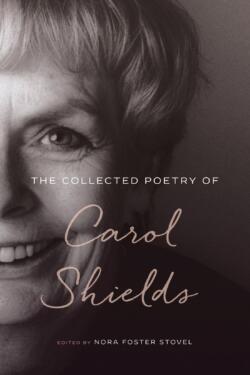 Disclaimer: I do not know the kitchen witch known as Mandi Em, and Carol Shields was and remains a dear friend, best book friend ever, and my response to her spells is personal, academic, and sometimes ironic, the style of our many delightful and sometimes bitchy conversations about other people’s literary endeavours.
Disclaimer: I do not know the kitchen witch known as Mandi Em, and Carol Shields was and remains a dear friend, best book friend ever, and my response to her spells is personal, academic, and sometimes ironic, the style of our many delightful and sometimes bitchy conversations about other people’s literary endeavours.
You might call the collected poems of Carol Shields The View From My Kitchen Window, but this is a book produced by academics with whom Carol had a gently adversarial relationship. After all, she got the small office and “the treatment.” It is difficult for young women to understand how it was then, when their foremothers were subjected to daily intimidation, assault, insult, and plagiarism in the stacks.
No wonder she was careful, stuck to the recipes except for the stunning surprise breaks that made her memorable, what she saw beyond her kitchen as she stared into the wild blue yonder, freedom from the narrow definition of women in the Bible and Good Housekeeping magazine! In The Sunday Poems, she began constructing secular scriptures.
Some people, doing the cathedrals,
of Europe, romantically light candles
To that emptying glass, their life
others stay home
reverently watching the midnight movie
their whole lives a foreign film
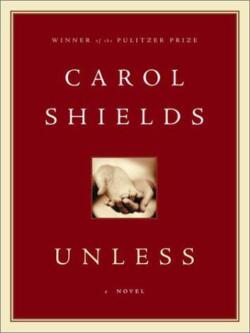
Her last novel, Unless, of which I was the first informal editor, starts with an image she tried out in an early poem: “Happiness is the lucky pane of glass you carry in your head.” We hear that pane laughing while she cleans it with her recipe for window cleaner, a little sugar a little vinegar. Carol Shields loved clarity in writing, her highest praise for “crisp’ and “clear.” Now wait, for the glass crash is a lurking caveat.
Surprise is what she practised so diligently in her poems and what carried over into her prose, which is, as someone said about Beethoven, better than it sounds. She did love the sound of glass breaking. That was her gift, exploded in “Cliché” a “moon run ragged by weather.”
So that what you are
or were has burst,
shut
up in blown out images
Carol was a minor poet and a minor novelist until The Stone Diaries gifted her with fame and the house in France she and Don called “Chateau Pulitzer.” The Vancouver Sun gave my review a full page and a beauty shot and Carol, an acquaintance until her pivotal moment, called to say, “You are the only one who gets it.”
Of course I did. It was easy, and so many followed. Women shared experiences, especially back then. “Then” we became buddies because she longed to cut the traces, wear gypsy dresses, and rock around the clock with a fellow rebel. Don, not so much. Not at all. Death was already dancing her away and he wanted her more, just as he knew her, his kitchen goddess sticking to her recipe, normal life.
One day, shortly before Carol went to spirit, my husband delivered my invalid chicken soup and found her passing on the family pastry recipe to one of her daughters. The kitchen was a mess, flour everywhere, he reported. Carol was not actually known for her food craft. She cooked better with words. Cuisine chemistry was a lesser priority as we noticed love for family mixed with conflict about making space, the work/ play balance in her life. Her window was a never ending movie. She had work to do and time was short.
“Why are your grandchildren so imaginative?” she asked. “We play.” I answered. And I recognize that ambivalence in the poem “The New Mothers.”
The egg bald babies lie, stretching
pink like rows of knitting
insects in cases and cry
tiny metal tunes,
hairpins scratching sky.
*
 Which brings us to Mandi Em, the kitchen goddess whose guide to banishing bullshit and evoking your inner power might have reduced Carol to a puddle on the threshold of freedom, another incarnation. Poetry is really spells, witches’ work. Em, in her how to be a witch kit, advises: “Feeling uncomfortable things is never fun, but for those who’ve experienced trauma or other deep-cutting pain it can become a very real part of your everyday experience. Wake up. Brush teeth. Sob into the void…”
Which brings us to Mandi Em, the kitchen goddess whose guide to banishing bullshit and evoking your inner power might have reduced Carol to a puddle on the threshold of freedom, another incarnation. Poetry is really spells, witches’ work. Em, in her how to be a witch kit, advises: “Feeling uncomfortable things is never fun, but for those who’ve experienced trauma or other deep-cutting pain it can become a very real part of your everyday experience. Wake up. Brush teeth. Sob into the void…”
Carol Shields did not sob, not even when she faced a stab in the breast, her ironically female death. She raged in the most exquisite ways, exchanged her middle class collegiate wife gear for “Gypsy” thrift we snuck into her house after her husband described them as “pyjamas,” danced to rock and roll, and wrote windows around her glass house, transparent to all who chose to look in. She was a transformer and the recipes were her poetry, because she understood as well as anyone that craft is transcended in great art, cooking from the heart.
The day she got the diagnosis her cancer had returned, we went to a concert by my husband’s band Love Gone Bad, and Carol, dazed by medication and bad news, got up and danced to the song “Mostly Water.”
Little things go wrong
We’re here and then we’re gone
Shout all you want it doesn’t matter
Don’t you know that I am mostly water
And the words kept flowing into her last book while I wrote the novel, Friday Water, which she edited, about a ballerina with breast cancer because she wouldn’t touch the painful subject, although she gave the book an edit, looking for the details that make life with brutal pharmaceuticals so dehumanising. Note: hair, our crowning glory so important to poetry and bewitchment, is cruelly absent in cancer treatment.

To that end, we initiated a ritual at first shocking to the staff at Royal Jubilee Cancer Treatment Centre, called Chemo Picnic. The first chemo party, which consisted of Carol, Eleanor Wachtel and myself with a bottle of ginger ale, champagne glasses, and sandwiches with the crusts off, was a formal affair. We put on fancy hats and scarves specially made by Welsh Designer Patricia Lester, a silk velvet poet and Shields fan. Windows exploded in the chemo suite as others apparently followed the message, all of life is a celebration. Magic.
As influencer Mandi Em writes in her book, “A bucket list is a list of things you want to do before you … well, kick the bucket.” “Although it seems like kind of a morbid concept, it’s actually a really neat exercise that respects the idea of your own mortality…” as you “hang onto that shifty bitch called life.”
On Carol’s bucket list was The Giller Prize, which eluded her even though she wore my “lucky” deco Marcasite earrings (so much for magic), which got lost in the seams of her suitcase, to the gala. The subsequent anxiety was troubling, and it seemed she was searching for something else. I told her they didn’t matter, but she was a woman hanging on to life and the ongoing exchange of stories.

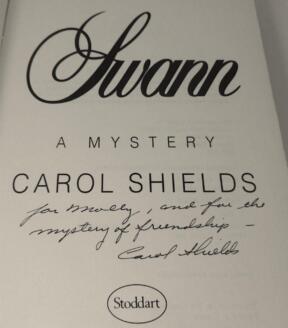
In the end the knock came: glorious lead singer Bruce Rathie, who was soon to follow Carol to spirit, came to her door to sing “Mostly Water,” an elegant segue to the spirit world, while she hid in the shifty space between worlds in a house full of antique clocks, as described in “A Woman We Know Who Suffers from Occasional Depression.”
The trick
is to find the square
route of a clock tick
and hide there.
Carol Shields was a curious woman, her approach to life and art scientific, detail oriented. If there were one symbol allowed on her grave marker or the cover for her book of poems, it should be “?”
She was not a fairy person, given to banal mystery, even though magic interested her, as she writes in “A Cynical Friend Explains,”
I relinquished magic, seeing in an instant
that, like the unconcerned sun,
the moon, distant,
and democratic, followed everyone.
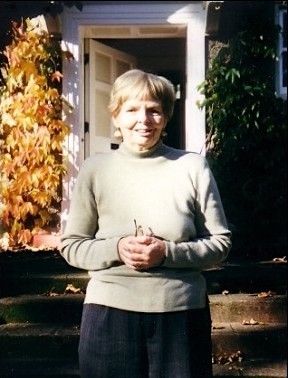
There are recipes for magic with moonwater and moments when we mortals have to clap our hands and believe. It is the impetus for clapping that fascinated the author of these poems. She almost believed, but then there is all the empirical advice not to.
Marriage is the greatest fairy outcome, and yet the bride in “A Wedding We Went to Once” muses:
Before you came
with your not quite
holy love, the dialogue
in my head
had gone on for years.
It was a game I needed then,
played out of sight
and left unsaid,
my midnight catalogue
of questions and answers
which led,
over and over again, nowhere.
Nowhere is the void she filled with crisp language, and, when all the Earth spells had been used up, the ferryman waited. In the end, poetry outlives shadow figures dancing in moonlight.
If there are no spells for happy marriage, there are contracts when “…nerve ends scratch, selfish as hens but all we can do is make new bargains.” When I spoke at Carol’s funeral, I noticed a glance and a gesture between the grieving loyal husband and her litigator son: “Off with her head.” The new Carol, burning Oolichan oil on her way to the light, and her disruptive friend were enigmas to them, as frightening as death’s darkness.
Shortly after, we invited her husband to dinner at a supper club where my husband was playing with Light, Sweet Crude, an Americana band. Not Mozart. My treat. The widower got up and moved to another table where he sat down with a pair of uber academics, a type Carol could caricature beautifully. By the end of the evening, they had complained the band offended their exquisite sensibilities and had the band fired. Et tu?
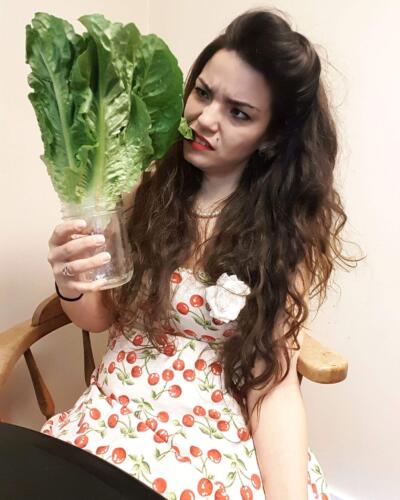
This was the resolution of quiet domestic dispute, the lines between the lines in Shields’ poetry, which longed for freedom within academia and possibly marriage, the condoned sacrament for misogyny. She had asked for a rock and roll funeral and got a string quartet, though some anarchist played Carol’s records in a back room, where some of us danced like everyone was watching. This explains the tension in the poetry, and, to a greater extent, fiction that pits woman against the patriarchy.
It was synchronicity that brought two books by women, one a respected novelist and the other a spellcaster, a generation apart, to this desk. Carol would have had so much fun writing about a character like Mandi Em. As an apostate Methodist, she would have recognised the cant in new age dogma, probably admiring the potential in candles and water, which both appreciate as essential magic, but stopping short of belief in actual hocus pocus. There is no doubt their loci intersect in interesting ways, belief in the transformative power of carefully chosen words and metaphors that translate spirit in the phenomenal world.
In fact, the Mandi Em chapter headings could be a poem by Carol Shields.
Challenge the Helplessness Myth
Tap Into your Intuition.
Hang Onto That Shitty Bitch Called Life.
Create a Bucket List.
Shake That Thang.
Open the Circle.
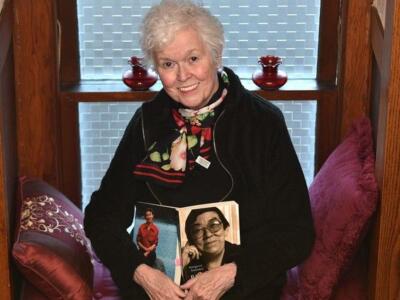
Carol’s poems are not genius connecting one human to another. They are notes to self, sketches for the revelatory murals she painted on her suburban walls. Her gift was for friendship and the female conversation she expanded into wonderful novels brought alive by attention to detail. She touched the ordinary and reached for the extraordinary, completing the magical equations of church and supernaturalists like Mandi Em. And as New Age turns to old age, her notes and the Em prescriptions will remain as signatures of their times. The water keeps moving as every word is transformed. That is women’s work with divine intention, the Yoni Games!
We have poems, recipes, prayers, spells, and prescriptions, all of them language that connects sentient beings to the idea of a cure for life, which always boils down to (mostly) moon water, the eternal mother. In her poetry, the queen of domestic literature, Carol Shields, embraced that notion as does the kitchen witch Mandi Ems, both of them prescribing for the women and children in their spiritual care, ending the prayer with,”Ah! Women.”
*
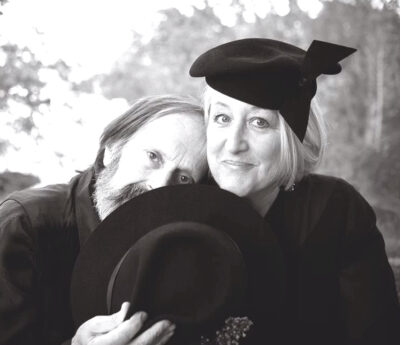
Linda Rogers, a Canadian People’s Poet, has spent the pandemic gathering writing, design, and visual art by her swan sisters, by many creators for the anthology Mother, the Verb, the Swan Sister Treasure Book, which affirms the importance of matriarchy in maintaining the balance of life. Editor’s note: Linda Rogers has recently reviewed books by Sue Goyette, Cid V. Brunet, Betsy Warland, Yvonne Owens, Junie Désil, Rob Taylor, Andrea Actis, Grace Lau, Janet Gallant & Sharon Thesen, Philip Resnick, Celeste Nazeli Snowber, Patrick Friesen, Stephen Collis, Colin Browne, and Heidi Greco for The Ormsby Review.
*
The Ormsby Review. More Books. More Reviews. More Often.
Publisher and Editor: Richard Mackie
The Ormsby Review is a journal service for in-depth coverage of BC books and authors. The Advisory Board consists of Jean Barman, Wade Davis, Robin Fisher, Cole Harris, Hugh Johnston, Kathy Mezei, Patricia Roy, Maria Tippett, and Graeme Wynn. Scholarly Patron: SFU Graduate Liberal Studies. Honorary Patron: Yosef Wosk. Provincial Government Patron since September 2018: Creative BC
“Only connect.” – E.M. Forster

2 comments on “1271 Kitchen windows & witches”